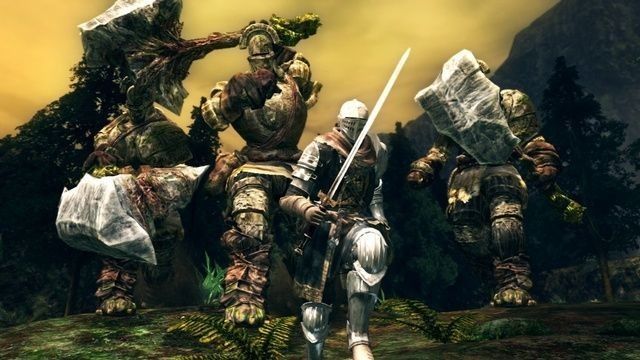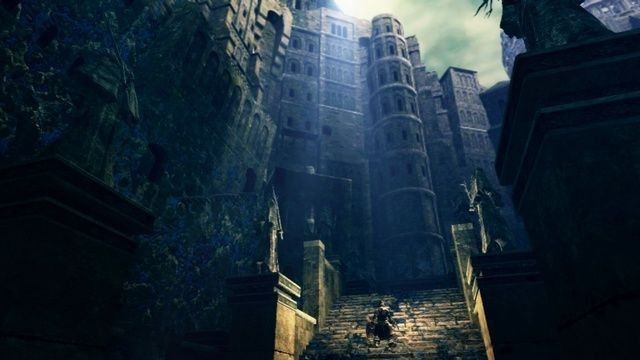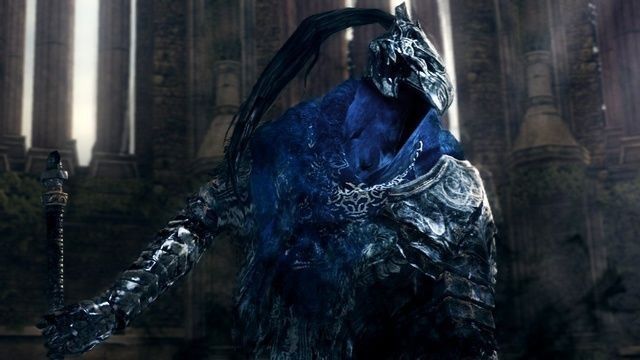So, when 90,000 cries for a PC version pricked up the ears of whoever had the gist of the online petition read to them, the overlords at Namco-Bandai commanded it be so, and probably had the people of From Software whipped for six months straight until the port was ready.
If the PC can be considered the home of the RPG genre, then Dark Souls has crashed through the window and landed onto the carpet in a bloody heap of jagged shards.
 |
| Run! |
Dark Souls arrives, as is. Without capacity to observe etiquette or custom, it is rudely flung into the abode of the PC, with none of the niceties. Blocky, obstructive menus hog the screen, and the control scheme has all the hallmarks of being laid out by someone who’s only heard of being able to use a keyboard to play games in the same hushed whisper as the news of El Chupacabra making its third visit in as many nights. A ridiculous idea to be scoffed at, but feared if true!
A bewildering and beyond unintuitive control scheme can be remapped, but as a guest in a foreign land, Dark Souls can’t speak the language of its host. A game that is infamous for being unremittingly hard delivers all its tutorial prompts on how to play the game as commands for a gamepad you may or may not own. It will take a concerted effort and some research to figure out what the controls actually are, unless you’re already playing with a gamepad, which is how it was intended, and makes no accommodation for otherwise. Unless of course your keyboard has something called a “left stick” in which case you’ll be fine.
On release, DS was resolution locked, but an enterprising modder stepped in with a fix and now enjoys a range of resolutions; it looks good, and better yet runs smoothly and stably, even with everything turned up. Loading times are seemingly nonexistent, but that small victory is soured by the unskippable developer credits which play at launch, and again upon exiting. DS appears to ‘reset’ itself back to menu screens, which comes across as shockingly lazy.
The port is also sure to eat your homework, kick your dog, insult your mother and drive up insurance premiums. Put plainly, it’s a lacklustre port with problems.
But like that eponymous dark soul whose role you take, come shambling out of the torturous limbo of an existence between life and death where all we do is bitch about technical failing, and you will see, in the streaming light of the sun… Hope. Because underneath the wanting conversion, Dark Souls is still Dark Souls.
Perhaps ‘hope’ isn’t quite the word. The game earns every bit of its infamy for sadism. Skeletal horrors will leap out from dark places with no reservations about enlisting gangs of their friends to aerate your pancreas. Bottomless plunges beckon you to try their latest ‘plummeting adventurer’ package. Gargantuan demons will crush you into fine powder in a single slam of their colossal bludgeons. Dark Souls is merciless. You will scream, you will curse, you will exclaim that Dark Souls is no fun.
But you’ll keep coming back; because for every dialogue about video games becoming too easy, this is the ultimate conclusion. In place of hand holding it only offers broken fingers, and laughs in your face with a tasteless jibe about undone shoelaces. It’s that challenge which is so compelling; every single part of DS is such an uphill scrape that when you finally best the beast who’s been slapping you about for hours or the rage inducing ambush you’ve stalled at, the victory feels truly earned.
 |
| Impressive vistas are a common sight, outside of dank dungeons |
But challenge alone isn’t what elevates it into realms apart from its contemporaries. It’s that Dark Souls subverts everything that’s expected of it.
The choice to do away with genre standards like maps and quest-logs accentuates the feeling of loneliness. It’s striking how much more immersive and daunting it is to have to navigate the world and the events within it, when there’s no silent assistant keeping track of logistics for you. You’re on your own. Similarly, the melding of experience and currency together into the ghoulish wealth of souls presents an ever tricky ongoing choice between upgrading skills or equipment. Preserving spectral monies can be just as trying, as every fatal misstep is tithed by the loss of souls (with one, singular chance for retrieval) and humanity; the latter a unique addition that elevates characters from the soulless Hollow.
Dark Souls mentions something about a prophecy and a chosen one in its opening cinematic, but it never feels like it’s about that. It’s about survival, pure and simple. It’s about struggling to ascend from a pit of despair, a hopeless place, and finding a way to make it happen.
Except… You’re already dead. The undead plague Lordran and you are among them. How does it feel to be a burden to society?
As brief as it is, the accompanying mythology is novel and powerfully evocative, only ever giving away that next tiny taste that adds another layer to the foreboding atmosphere. The narrative isn’t forced; it can be discovered, experienced or ignored, like many other things that make up the journey. There’s no set path to take; any area can be approached or stumbled into through one of the myriad connecting paths. The only real deterrents are locked doors, or how brutal a death lurks within.
Dark Soul’s world is interconnected and brimming with (un)life. The transition between areas is seamless from a technical perspective and organic where immersion is concerned. You really begin to believe Lordran is a real place. Blighted and forsaken, but real. This is something that very few titles ever really achieve, and the way space and structure are utilised makes it both memorable, encouragingly rewarding to explore, and above all, convincing.
Combat plays a major role in the game, and is deceptively involved. Heavily reliant on a sense of opportunity; choosing the right time to strike, evade or parry is key and not dissimilar to The Witcher 2 in many respects, simply far harder, and more nuanced. The reliance on a stamina bar to govern actions adds a strategic edge; an intrinsic part of the game becomes managing stamina, and is another piece of the wider whole of the focus on tactics.
 |
| Things don’t always go to plan in Dark Souls |
This is personified by the quiet innovation of allowing any weapon to be toggled as single or double handed, trading defence for swiftness and power.
There’s definitely an initial hump where it feels like enraging slap in the face after slap in the face, but slowly, patterns begin to emerge, behaviour of foes becomes obvious, plans begin to formulate, and it all starts to pay off.
Of all the elements to worry about, the invasion of other players is a perpetual source of consternation, and genuinely feels like a violation of the rules Dark Souls operates by. The lure of restored humanity is powerful enough to seduce others into being phantasmal jerks as they brazenly invade your private game for their own personal gain and the fight to the death that ensues is a perfect example of what Dark Souls offers: Stressful, but perversely enjoyable encounters wrought with bitter struggle that hang on a grasp of tactics, with dire, inescapable consequence, or fabulous prizes waiting in the wings.
Games For Windows Live might encumber the co-operative option, but the choice is there for charitable phantoms who wants to aid their fellows and jump into their game. The important thing is that Dark Souls never breaks character; even online play is a vortex of suffering or a triumph for the spirit of unity over the malign.
Even the messages other players leave strewn around are part of the rich tapestry of Lordran’s aura of an era spanning world filled with legions of similarly charged adventurers, out to help, or hinder with false advice, only further brings Lordran to life.
Brooding, complex and rewarding; Dark Souls is like fighting your way out of the most sinister and unforgiving of folklore. It offers an experience rooted in what should be vaguely familiar but defies comparison at every turn, because behind each turn something horrible awaits: Floors cave in, the inanimate comes to life, dragons burst through ceilings; the incredible breadth of event and scale never turns stale. It’s a summation of just how meticulously crafted Dark Souls is, that nasty surprises can be a source of wonder and Stockholm Syndrome fuelled grudging respect as well as a font of outrage.
The ritual unfairness of challenging monstrous colossi that might have stepped out of a radioactive fable, is fluid, responsive and natural, even tactile; whether it’s a case of jumping on titanic heads like a murderous flea, or being chased up towers by demonic King Kong, the scope on offer feels near limitless, and is there to be crawled all over.
You are a gnat that after many squashings will fell giants. Dark Souls twists the typical power fantasy that many videogames operate by and actually makes it constructive. Through hard work and perseverance can you break from insignificance and make a mark on a world that wants nothing more than to stamp you into dust.
Underneath the port inadequacies is a masterful piece of design; intricate and drenched in woe. Dark Souls is infuriating, but well worth the investment in time and shattered patience. There’s only one way to know for sure, and that’s to experience Dark Souls for yourself.
DARK SOULS: PREPARE TO DIE EDITION VERDICT
Underneath the port inadequacies is a masterful piece of design; intricate and drenched in woe. Dark Souls is infuriating, but well worth the investment in time and shattered patience. There’s only one way to know for sure, and that’s to experience Dark Souls for yourself.
TOP GAME MOMENT
Dark Souls is made of stand out moments, but banishing invaders (the hard way) never gets old. Begone evil one!




